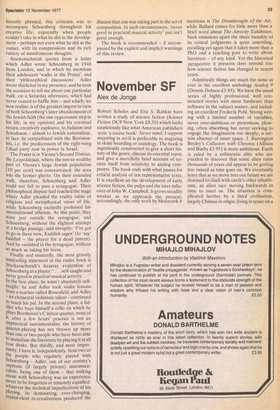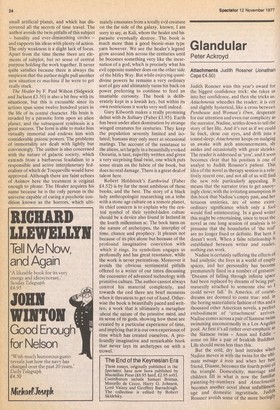November SF
Alex de Jonge
Robert Scholes and Eric S. Rabkin have written a study of science fiction (Science Fiction OUP New York £8.50) which looks suspiciously like what American publishers term 'a course book', Never mind; I suppose majoring in sci-fi is preferable to majoring in skate boarding or sociology. The book is ingeniously constructed to give a short history of the genre, discuss its essential topoi, and give a mercifully brief account of science itself from relativity to analog computers. The book ends with what passes for critical analysis of ten representative texts. It is excellent on the development of early science fiction, the pulps and the later influence of John W. Campbell. It grows steadily weaker as we approach the present; astoundingly, the only work by Moorcock it mentions is The Dreadnought of the Air, while Ballard comes for little more than a brief word about The Atrocity Exhibition. Such omissions apart the sheer banality of its critical judgments is quite unsettling, recalling yet again that it takes more than a PhD and a teaching post to write about literature — of any kind. Yet the historical perspective it presents does remind one how science fiction has changed in recent years.
Admittedly things are much the same as ever in the excellent anthology Analog 9 (Dennis Dobson £3.95). We have the usual series of highly professional, well constructed stories with more hardware than software in the subject matter, and including an excellent Frederik Pohl. Strong writing with a limited number of variables, never over-ambitious or pretentious, pleasing, often absorbing but never seeking to engage the imagination too deeply; a certain absence of inner space. J. Barrington Bayley's Collusion with Chronos (Allison and Busby £3.95) is more ambitious. Earth is ruled by a militaristic elite who are puzzled to discover that some alien ruins thousands of years old appear to be getting less ruined as time goes on. We eventually learn that as we move into our future we are destined to clash with earth's other inhabitants, an alien race moving backwards in time to meet us. The situation is complicated further by a third civilisation, largely Chinese in origin, living in space on a small artificial planet, and which has discovered all the secrets of time travel. The author avoids the twin pitfalls of this subject banality and ever-diminishing circles and supports his ideas with plenty of action. The only weakness is a slight lack of focus. Apart from the time theme there are elements of subplot, but no sense of central purpose holding the work together. It never quite satisfies because there is always the suspicion that the author might pull another new situation ex machina if he were to get really stuck.
The Healer by F. Paul Wilson (Sidgwick and Jackson £3.50) is also a bit free with its situations, but this is excusable since its actions span some twelve hundred years in the life of its central character. His brain is invaded by a parasitic form upon an alien planet, and the subsequent symbiosis is a great success. The form is able to make him virtually immortal and endows him with considerable psionic powers. The problems of immortality are dealt with lightly but convincingly. The author is also concerned with the nature of galactic society, which extends from a barbarous feudalism to a responsible and active interplanetary federalism of which de Tocqueville would have approved. Although there are faint echoes of Asimov here the treatment is original enough to please. The Healer acquires his name because he is the only person in the universe capable of curing a psychotic condition known as the horrors, which ulti mately emanates from a totally evil creature on the far side of the galaxy, known, I am sorry to say, as Kali, whom the healer and his parasite eventually destroy. The book is much more than a good bionic-man type yarn however. We see the healer's legend grow around him across the centuries until he becomes something very like the incarnation of a god; which is precisely what his evil opposite number does on the other side of the Milky Way. But while enjoying quasidivine powers he remains a very ordinary sort of guy and ultimately turns his back on power preferring to continue to feed an insatiable curiosity. The book is deliberately kept in a lowish key, but within its own restrictions it works very well indeed.
Gary Kilworth makes a really promising debut within Solitary (Faber £3.95). Earth has been under alien domination by strange winged creatures for centuries. They keep the population severely limited and isolated; humans may only meet at occasional matings. The account of the resistance to the aliens, set largely in a beautifully evoked Oceania, is taut, superbly written and given a very surprising final twist, one which puts some strain on the fabric of the book, but does no real damage. There is a great deal of talent here.
Robert Holdstock's Earth wind (Faber £4.52) is by far the most ambitous of these books, and the best. The story of a black lady anthropologist researching on ,a tribe with a stone age culture on a remote planet, its chief concern is to explain why the central symbol of their symbol-laden culture should be a device also found in Ireland in the fourth millennium BC. The book turns on the nature of archetypes, the interplay of time, chance and prophecy. It pleases not because of its plot alone but because of the profound imaginative conviction with which it rings. Its symbolism engages us profoundly and has great resonance, while the work is never pretentious. Moreover it avoids the obvious sentimental pitfalls offered to a writer of our times discussing the encounter of advanced technology with primitive culture. The author cannot always control his material completely, and towards the end there are brief moments when it threatens to get out of hand. Otherwise the book is beautifully paced and written; a work that is ultimately a metaphor about the nature of the primitive mind, and its sense of its gods, showing how these are created by a particular experience of time, and implying that it is our own experience of time which has created ourselves. A profoundly imaginative and remarkable book that never lays its archetypes on with a trowel.



































 Previous page
Previous page